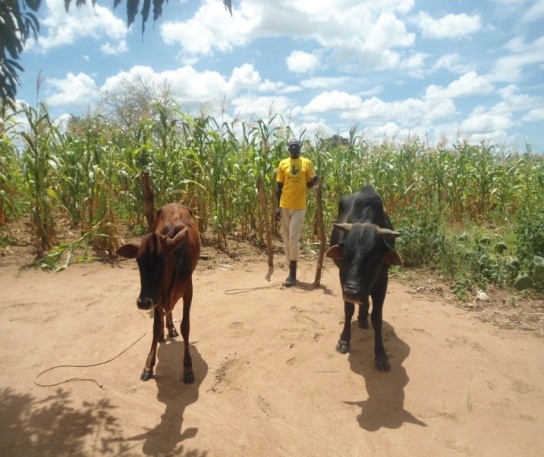
May 2014—Across the eastern Acholi sub-region of Uganda, small business entrepreneurs are engaging in new market opportunities and taking the first steps out of poverty. Through a network of community knowledge workers (CKWs), village members are working together and creating a sustainable model to help rebuild livelihoods in the formerly war-torn part of the country.
Due to years of armed conflict in the Acholi and neighboring Karamoja sub-region, a large percentage of households relied on food aid, and 25 percent of children were reported as underweight at the height of the crisis in 2007. In response to food insecurity and recovery needs, USAID and Mercy Corps partnered from 2008 to 2014 on a development food assistance program to help former internally displaced persons rebuild their land, livelihoods and lives.
George Okello from Tongrom village in northern Uganda is one such CKW who has dedicated time to serve his community and intends to leave a legacy. “I will never be the same, thanks to Mercy Corps,” he explained.
The program has empowered CKWs to become entrepreneurs and create a self-sustaining system linking farmers to markets. Recruited from local villages, CKWs were trained to use low-end smartphones to collect and disseminate agricultural market information to help farmers select crops and increase their market opportunities. As agricultural intermediaries, CKWs charge farmers a small fee for market information, creating accountability for CKWs and an incentive to continue providing these services beyond the life of the program.
CKWs also acted as field officers and trained smallholder farmers on effective agricultural practices, including crop rotation, managing livestock, pest control and postharvest handling practices. In fiscal year 2013, 23 CKWs reached more than 4,000 farmers and earned a total of over $2,000 in commissions.
Okello used the knowledge he gained to increase his own dry season yields by applying manure to his maize crop. “With the proceeds earned from my harvest, I bought two cows,” he remarked. He planned to continue training farmers and providing them with information on weather, agriculture and markets.
To improve access to quality inputs such as seeds, fertilizer and agro chemicals, the program partnered with the Ugandan National Agro-Input Dealers Association (UNADA) that trained and recruited over 18 input agents. The agents then supplied a variety of inputs, including maize, sorghum, beans and vegetables valued at $39,257 to more than 3,700 farmers in fiscal year 2013. Inputs came from both input companies as well as contract farming companies, all with long-term interest in increasing farmer productivity in the sub-region. Several CKWs are also planning to start input businesses next season.
Auma Grace is one input agent who was recruited and trained with support from the program. Through her extensive network of smallholder farmer peers, Grace sold 216 kilograms of sorghum seeds to 54 farmers. She also established two demonstration plots for beans and maize, using them as a foundation to train 67 farmers on land preparation, line planting and plant spacing—trainings she herself received from UNADA.
To improve market opportunities, the program set up a farming contract scheme in which farmers were guaranteed markets to sell their sesame and white sorghum crops. Mercy Corps partnered with two agribusiness companies in fiscal year 2013 that enabled more than 7,500 farmers to produce a total crop value of over $3.5 million, or approximately $240 per farmer. In total, 16,371 acres of land yielded 4,374 tons of sesame and white sorghum. There are now five agribusiness companies actively buying sesame from farmers, creating a more competitive environment.
“I linked a six-member farmer group to buyers from a neighboring district,” said Okello. As a result, the farmer group sold 3 tons of millet at once. A transaction like this used to be not only uncommon but unbelievable to many farmers. With the profits earned, each farmer bought a cow for themselves.
As the program closes and Mercy Corps no longer supports training CKWs, the Grameen Foundation has committed to further development of the CKWs' skills so they can stand on their own as small business entrepreneurs. The success of the program has empowered farmers, input agents and buyers to expand their networks, increase their overall profits, and rebuild their livelihoods.
Links







Comment
Make a general inquiry or suggest an improvement.